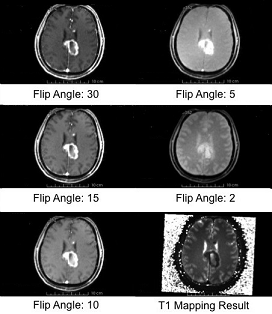Difference between revisions of "Documentation/Nightly/Modules/T1 Mapping"
Stevedaxiao (talk | contribs) |
Stevedaxiao (talk | contribs) |
||
| Line 31: | Line 31: | ||
<!-- ---------------------------- --> | <!-- ---------------------------- --> | ||
{{documentation/{{documentation/version}}/module-section|Use Cases}} | {{documentation/{{documentation/version}}/module-section|Use Cases}} | ||
| − | * | + | *Take multi-spectral FLASH images with an arbitrary number of flip angles as input, and estimates the T1 values of the data for each voxel. |
| − | *Read repetition time(TR), echo time(TE) and the flip angles from the Dicom header directly | + | *Read repetition time(TR), echo time(TE) and the flip angles from the Dicom header directly. |
*Prostate, brain, head & neck, cervix, breast and etc. | *Prostate, brain, head & neck, cervix, breast and etc. | ||
{| | {| | ||
Revision as of 02:55, 21 March 2015
Home < Documentation < Nightly < Modules < T1 Mapping
|
For the latest Slicer documentation, visit the read-the-docs. |
Introduction and Acknowledgements
|
Extension: T1_Mapping | |||||||
|
Module Description
T1 mapping estimates effective tissue parameter maps (T1) from multi-spectral FLASH MRI scans with different flip angles.
Use Cases
- Take multi-spectral FLASH images with an arbitrary number of flip angles as input, and estimates the T1 values of the data for each voxel.
- Read repetition time(TR), echo time(TE) and the flip angles from the Dicom header directly.
- Prostate, brain, head & neck, cervix, breast and etc.
Tutorials
Panels and their use
|
Similar Modules
References
Information for Developers
| Section under construction. |
Source code: https://github.com/QIICR/T1_Mapping




